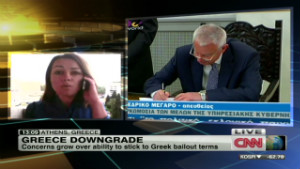A Greece euro exit could make Lehman's collapse 'look like a tea party'
May 21, 2012 -- Updated 1635 GMT (0035 HKT)

A woman points at the parliament building during a protest in front of the Greek parliament on April 5, 2012.
London (CNN) -- The wheels are coming off the wagon.
The fat lady is about to sing. The proverbial is about to hit the fan.
It doesn't matter which saying you use, the facts are inescapable.
Greece's membership of the eurozone is untenable under the current
conditions and everyone knows it. Some like Hungary's finance minister
say openly Greece will leave the euro. The only question is what catalyst will force it out and when.
The nearest deadline to hand is the country's June 17th elections, when
the Greek voters will decide whether to support parties who will adhere
to the bailout agreements or those who want to tear them up.
-
Private economists have
gone into overdrive trying to work out what will happen. On Friday, Bank
of America Merrill Lynch published "what if Greece Exits the Euro"
describing the risk as "rising." Citigroup uses the word "probable" for
an exit in certain circumstances while Barclays published "dealing with a
potential Greek exit" and says "over the longer horizon the likelihood
increases."
-
For the more circumspect
euro politicians who have to manage this crisis, there are now well
trodden formulae trotted out whenever Greece's euro-future is mentioned.
It goes something like this: 1. We want Greece to stay in the euro. 2.
Greece must abide by the terms of its agreements with lenders. 3. It is
up to the Greek people how they will vote and if they remain in the
euro. Think of it as the euro-dance....two steps forward one step back.
-
Some Europe officials have become truly expert at performing this dance. Olli Rehn, the European Union economics chief,
reiterated it to me on Friday. And yet, I reason they must be
contemplating what happens when the music stops and the euro-dance comes
to an end. They read the same economics as the rest of us. They know
that the Greek economy is deeply uncompetitive. The reforms need not
only to continue, but speed up if Greece is not to remain on euro-life
support forever. The only question is whether the Greek people are
prepared to put up with the pain.
-
Each day there comes a new twist into the euro-dance. Last Friday it was the rumor that Mrs. Merkel had asked Greece to hold a simultaneous referendum with
the election on euro-membership. The report came from Athens: Berlin
denied it. Clearly one side or the other is playing high stakes hoping
to force the issue.
 Rehn: Euro is better off with Greece
Rehn: Euro is better off with Greece
 Quest on Greece crisis: Can get 'worse'
Quest on Greece crisis: Can get 'worse'
 Frieden: No Greek exit plan in the works
Frieden: No Greek exit plan in the works
 Greece credit rating downgraded
Greece credit rating downgraded
--
The argument goes like
this: Since every poll shows a significant majority of Greek people want
to stay in the euro, make the June vote a referendum on this issue and
voters will come to their senses and be herded back to safely voting for
those parties committed to the euro-dance formula.
-
While I've no idea how
these next Greek elections are going to turn out, my gut feeling is that
the other eurozone countries are likely to stay with the stick, and
keep any carrots to offer if and when the voters return to their sanity
(as seen from Brussels).
But opinion polls show
Greece's left-leaning Syriza party, which does not support the austerity
plans, has maintained momentum on the back of the Greek people's
discontent. If this continues, prepare for Greece to crash out of the
euro sooner rather than later.
-
Because if they do not
follow the austerity plans, the Greek government will not receive more
bailout loans to pay its debts. And if that happens, it's not going to
be pretty. The Greek banks will collapse -- they are already on fraying
central bank lifelines -- unemployment will soar and I wouldn't rule out
civil unrest. Who knows what it will look like.
Despite everyone talking
about other countries that have defaulted then recovered strongly
(Argentina, Russia) the reality is nothing this complicated has ever
been tried before, certainly not in such a global interconnected world.
Let me say it clearly and loudly. The fear is that Lehman Brothers in
2008 will look like a tea party if they get this one wrong.
What is worrying is that
if Greece (only 3% of EU economy) goes is who will be next? Hungarian
finance minister Gyorgy Matolcsy, who I also spoke to Friday, thinks
Greece won't be the only country to exit.
-
Obviously now everyone has Spain in their sights.
And there is where the real problem lies. Spain is too big to fully
bail out a la Greece and definitely too big too fail. If Spain gets into
too much trouble "Project Euro" is likely over. From all my private
talks with European officials it has become clear -- Spain is the line
in the sand. Greece may be too far gone and be allowed to fall, but
Spain will be defended till the bitter end. So I fully expect European
leaders to give Spain something to take the boot off the throat of
austerity in the coming weeks. Probably the same for Portugal.
-
European officials have
made mistakes in their dealings with Greece. The austerity measures were
too harsh. They shouldn't have been nearly so brutal, and that lesson
has been learnt. Now with the election of Francois Hollande as France's
new president everyone can change course slightly and pretend they meant
to do it all along (they didn't).
-
Expect a growth pact to be agreed
between Germany and France to sit alongside the main Fiscal Compact,
which Germany will not allow to be re-opened.
I could speculate for
hours about which solution will be found, what formula they will adopt
to keep the whole thing moving -- and frankly, it would be useless. This
crisis is now moving too fast and has taken on a life of its own.
-
The
firewall is starting to smolder. The austerity plans are starting to
fray. The European Central Bank is cutting loose several Greek banks it
does not consider solvent. The eurozone is all but back in recession.
There are some uncontrollable aspects (the Greek voters for instance)
which make forecasting the future direction just about impossible.
-
I still believe that the
single currency will survive in some shape and form. I just cannot see
the eurozone surviving in its present form -- not without the most
drastic re-organization towards fiscal union, a federation of states
with a central bank and treasury.
Please, eurozone, don't
tell me that is not the European way. I am telling you....it's the only
way. Your way has failed and Europe's 300 million people are now
relegated to slow, second class growth as a result for the foreseeable
future.

No comments:
Post a Comment